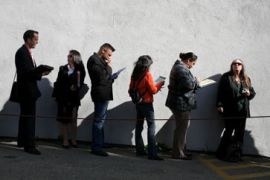Job fairs boom amid economic crisis
As unemployment rises, many in the US line up to meet with potential employers.

 |
| Long queues form at job fairs across the US [GALLO/GETTY] |
The line to get into the job fair stretched around three sides of one block.
More than 2,000 job seekers turned out at a Midtown hotel in New York City to shake hands, exchange business cards and score a quick interview. Either out of work or soon to be, they were all seeking a way to turn their fortunes around.
Keep reading
list of 4 itemsWhy are nations racing to buy weapons?
Parallel economy: How Russia is defying the West’s boycott
US House approves aid package worth billions for Ukraine, Israel
Thirty employers waited inside, each with their own selling points – from sales to health care to opportunities in the military.
With the unemployment rate soaring to its highest level in over 15 years, many job seekers are feeling anxious. For every position available, there are many qualified candidates.
Barbara Safani, the president of Career Solvers, a career consultancy company, says many of the firms in attendance may not be actively recruiting but rather using job fairs as an opportunity to market their brand.
“A lot of companies still attend these job fairs to keep their pipeline strong even if they are not going to hire,” she said.
High-performing candidates
| In depth |
 |
|
|
Peter Stack, the vice-president of insurance company MetLife, which had several booths at the fair, said the economic crisis has not altered their hiring policies.
“We’re still looking for high-performing individuals. It’s always good to have such rich talent,” he said.
Some employers are making the most of rising unemployment to improve their workforce, says Jennifer Grasz from careerbuilder.com, a recruitment website.
“What we are seeing is that employers are taking this time to upgrade their talent roster.
“They’re replacing lower-performing employees with higher-performing candidates that may not have been available in a healthier job market. So, they are able to access a greater pool of talent,” she said.
Grasz says the companies benefiting most from the economic crisis are outplacement firms – the outfits hired by employers to provide career counselling to the employees they lay off.
Long-term unemployed
According to a poll released by the Pew Research Centre, 40 per cent of Americans have been affected by some kind of employment-related problem in the past year, be it unemployment, underemployment, reductions in pay or hours, or family members being laid off.
Fifty-six per cent of those polled expect the situation to either deteriorate or stay the same in the next year.
The US Federal Reserve has also predicted that the economy will continue to shrink, pushing the unemployment rate even higher.
With limited opportunities available, the unemployed are now finding it increasingly difficult to become re-employed and according to US federal data, the number of long-term unemployed – those out of work for at least 27 weeks – has doubled to 2.6 million in the past year.
“I’ve been unemployed for almost a year now, and have applied for over 200 jobs,” says 55-year-old Arnold Morse.
“I worked as an accountant and it’s been hard for me to find a job because I don’t have a CPA [certified public accountant].
“It’s a test I should have taken 30 years ago when I first graduated from college but the way my career was going back then, I did not need it. Now a lot of places are looking for a CPA.”
“I tried temping [temporary work] for a month,” he adds. “But they decided I was overqualified for the job. It’s been pretty rough out there.”
Uncertainty
With the state of California’s unemployment rate reaching 9.3 per cent, Vince Torres decided to try his luck in New York.
“This is the second job fair I attended and I think ultimately the best way to get a job is by networking,” he said.
Some Federal Reserve officials fear it will take five to six years for the economy and employment to return to healthy levels. Employment is typically the last piece of the economy to heal as businesses slowly test the water before hiring again.
Jessica Moore, a single mother of two and a former retail employee, says: “What gets to me is the uncertainty, not knowing what tomorrow will bring.”
